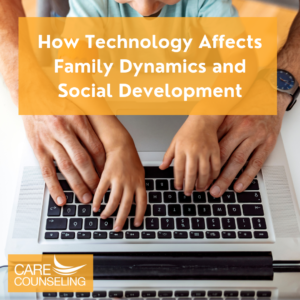How Technology Affects Family Dynamics and Social Development
 Technology has become an integral part of our daily lives, transforming the way we communicate, work, and entertain ourselves. While technology offers numerous benefits and conveniences, it also has a profound impact on family dynamics and social development.
Technology has become an integral part of our daily lives, transforming the way we communicate, work, and entertain ourselves. While technology offers numerous benefits and conveniences, it also has a profound impact on family dynamics and social development.
- Changing Communication Patterns
Technology has revolutionized the way families communicate. While it enables instant connection regardless of geographical distances, it can also disrupt traditional face-to-face interactions. Text messages, video calls, and social media have become common forms of communication within families, which may affect the depth and quality of personal conversations.
- Screen Time and Family Bonding
The rise of digital devices and screen time has changed the way families spend time together. While technology can facilitate shared activities like streaming movies or playing video games, it can also lead to isolation as family members immerse themselves in their screens. Finding a balance between screen time and quality family bonding is crucial.
- Impact on Parent-Child Relationships
Technology can have varying effects on parent-child relationships. On one hand, it provides opportunities for parents to engage in educational and recreational activities with their children, from interactive learning apps to gaming. On the other hand, excessive screen time or digital distractions may hinder parent-child bonding and limit quality time spent together.
- Digital Parenting Challenges
Parents face the challenge of managing their children’s access to technology. They must navigate the fine line between allowing beneficial educational and recreational use and protecting children from the potential negative effects of excessive screen time, cyberbullying, or exposure to inappropriate content.
- Fostering Independence
Technology can also empower children and adolescents by providing them with tools and information to explore their interests, research topics, and develop skills independently. This can foster a sense of autonomy and self-directed learning.
- Social Development
Technology plays a significant role in shaping the social development of children and adolescents. While it offers opportunities for connection with peers and access to a broader social network, it can also lead to social isolation if screen time becomes excessive.
- Impact on Face-to-Face Interaction
The widespread use of technology, particularly smartphones and social media, can affect the quality of face-to-face interactions. Family members, especially adolescents, may be more inclined to spend time on their devices during family gatherings or meals, which can reduce the depth and quality of interpersonal communication.
- Exposure to Digital Relationships
The digital age introduces the concept of digital relationships, where individuals connect and interact primarily through screens. Children and adolescents may form online friendships and relationships, which can have both positive and negative consequences on their social development.
- Cyberbullying and Online Safety
The digital world poses risks, including cyberbullying and online safety concerns. Children and adolescents are vulnerable to cyberbullying, harassment, and exposure to inappropriate content. Parents play a crucial role in educating their children about online safety and monitoring their digital activities.
- Technology and Academic Performance
Technology can impact academic performance. While it offers tools for research and learning, excessive screen time, gaming, or social media use can distract children and adolescents from their studies, potentially affecting their grades and educational progress.
- Family Conflicts and Screen Time
Disagreements over screen time and technology use can lead to conflicts within families. Parents may find themselves in disputes with their children over setting limits on screen time or online activities. These conflicts can strain family dynamics.
- Impact on Mental Health
Excessive screen time and social media use can have implications for mental health. It can contribute to feelings of isolation, anxiety, and depression, particularly among adolescents who may experience cyberbullying or negative social comparisons on social platforms.
Balancing Technology and Family Life
Balancing technology with family life and social development is essential. Here are some strategies to navigate the digital age effectively:
- Establish Screen Time Limits: Set clear guidelines for screen time and technology use within the family, taking into consideration the age and needs of each family member.
- Encourage Outdoor Activities: Promote physical activity and outdoor play to counterbalance screen time. Encourage children and adolescents to engage in sports, hobbies, or outdoor adventures.
- Model Healthy Technology Use: Lead by example. Demonstrate responsible and balanced technology use to inspire your children to do the same.
- Emphasize Face-to-Face Interaction: Designate technology-free times, such as family meals, where family members can engage in meaningful face-to-face conversations.
- Educate on Online Safety: Teach your children about online safety, the potential risks of technology, and how to protect themselves in the digital world.
- Create Digital-Free Zones: Designate certain areas in your home as technology-free zones, such as bedrooms, to promote healthier sleep patterns.
- Encourage Digital Detox: Implement digital detox periods or family technology-free days to reconnect with one another.
- Monitor Content and Apps: Keep an eye on the content your children access and the apps they use, ensuring they are age-appropriate and safe.
- Promote Open Communication: Foster open and honest communication with your children, encouraging them to share their digital experiences and any concerns they may have.
Technology has become an integral part of family life, affecting communication patterns, family bonding, and social development. While technology offers numerous benefits, it also presents challenges in maintaining a balance between screen time and real-life interactions.
Parents play a crucial role in guiding their children through the digital age, providing education on online safety and setting boundaries for technology use. Striking a balance between technology and family life is essential to ensure that technology complements, rather than hinders, family dynamics and social development.



























